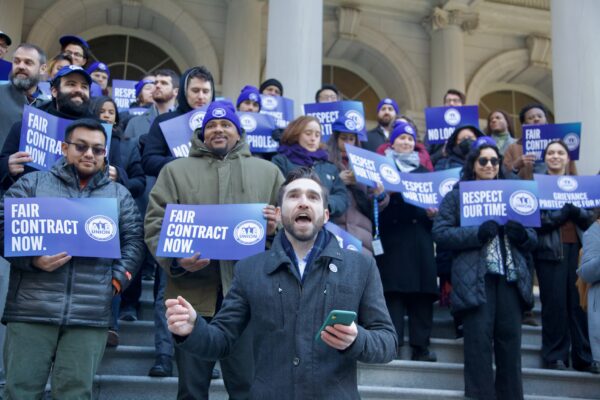February 25, 2015
By Steven Wishnia
After saying for several months that banning the union shop was not part of his agenda, Wisconsin Gov. Scott Walker announced Feb. 20 that he would sign a so-called “right-to-work” bill if the state legislature passed it.
The state Senate fast-tracked the bill by declaring an “extraordinary session” to prevent the Democratic minority from delaying it by not showing up and denying a quorum, as they did with Walker’s legislation that decimated collective bargaining for public-employee unions in 2011. The Senate might vote on it as soon as Wednesday, Feb. 25, and the Assembly is expected to consider it next week.
The bill, which would prohibit workplaces with union contracts from requiring employees to join a union or pay “fair-share fees” to cover the costs for the unions required to represent them, is part of a nationwide effort to have state legislatures undermine workers’ ability to organize and sustain unions. Similar bills have been introduced in at least nine other states this year—Colorado, Connecticut, Illinois, Kentucky, Maryland, Missouri, New Hampshire, New Mexico, and West Virginia. Rep. Steve King (R-Iowa) introduced one in Congress in January.
Wisconsin’s is the one most likely to be enacted. Republicans have a comfortable majority in the state House and an 18-14 one in the Senate. Senate Majority Leader Scott Fitzgerald told the Milwaukee Journal-Sentinel Feb. 20 that he had the 17 votes needed to pass it, and hoped he could push it through before opponents could mount a campaign against it, before unions could renegotiate contracts to delay its affecting them, and before it provoked protests like the ones at the state capitol against Walker’s 2011 legislation.
West Virginia’s might be second most likely. Republicans captured both houses of the state legislature last November. Gov. Earl Ray Tomblin, a Democrat often considered anti-labor, has not said he would definitely veto either of the two bills that have been introduced. He has said that he doesn’t think union shops have prevented businesses from moving to West Virginia, and that he doesn’t expect the Senate to pass the bill—although Majority Leader Mitch Carmichael is a cosponsor.
Backdoor efforts to undermine union shops are also underway in two states whose legislatures would almost certainly defeat these bills. In Kentucky, where a right-to-work measure died in committee in the Democratic-controlled state House Feb. 12, six mostly rural counties have enacted right-to-work ordinances since December, and several others are considering them. (A group of unions is challenging those laws in federal court.) In Illinois, Gov. Bruce Rauner issued an executive order Feb. 9 prohibiting the collection of fair-share fees from nonunion state workers (although that has been delayed by state officials who contend it’s illegal).
The Wisconsin bill states that no person shall be required to either “become or remain” a member of a labor organization in order to get or keep a job, or “refrain or resign from” membership. It also prohibits requiring them to pay dues, fees, or provide “anything of value” to a labor union—eliminating fair-share fees, the current legal outlet for workers who do not want to join the union that represents them.
Its language is virtually identical to that of a model “Right to Work Act” proposed by the corporate-far-right American Legislative Exchange Council. The Colorado, Illinois, Kentucky, Missouri, New Hampshire, New Mexico, and West Virginia bills all also echo the ALEC model almost verbatim, some of them down to a ban on paying fair-share fees to a “charity or other third party.” The West Virginia bills, however, both delete the fig-leaf clause prohibiting discrimination against union members.
Supporters, such as Wisconsin Assembly Speaker Robin Vos, promote these bills as a “worker freedom” issue. The ALEC model bill is subtitled “Freedom of choice guaranteed, discrimination prohibited.” But the anti-union agenda is clear. The National Right to Work Legal Defense Foundation’s list of “Big Labor’s Top Ten Special Privileges” includes the power to compel employers to negotiate and the ability to go on strike without being fired for “refusing to work.” In other words, the two powers that enable unions to be effective collective-bargaining organizations instead of collective begging societies.
In 2011, when Walker’s leading financial backer asked if he could “work on these unions” so Wisconsin would “become a right-to-work state,” the governor was filmed answering, "The first step is we're going to deal with collective bargaining for all public employee unions, because you use divide and conquer.”
“The principal aim of ‘right-to-work’ laws is to diminish the ability of workers to collectively bargain freely without the interference of government,” Ted Boettner of the West Virginia Center on Budget and Policy wrote in the Huntington Herald-Dispatch Feb. 20. “This is a prime example of government intervention in the market distributing money upwards.”
Twenty-four states currently outlaw the union shop. All were in the South, Plains, or Mountain West until 2012, when Indiana passed its law; Michigan followed in 2013. The current campaign seeks to expand the beachhead gained in the industrial Midwest and to fill in the blanks in the Border and Mountain states.
Missouri and Kentucky, however, both have divided government and significant union presence. In Missouri, where right-to-work bills have been introduced regularly over the last several years, the state House passed one for the first time on Feb. 12. Republican Senate Majority Leader Tom Dempsey told St. Louis Public Radio that he wouldn’t block it from coming to the floor, although he hadn’t decided if he’d support it. The Senate GOP, he added, is divided between rural-area senators, who are strongly anti-union, and senators from the St. Louis and Kansas City suburbs who have a large number of union members in their districts—so even if the bill passed, there probably wouldn’t be enough votes to override what he called “a certain veto” by Gov. Jay Nixon, a Democrat.
In Kentucky, the campaign for county right-to-work laws is an effort to evade the Democratic control of the state House. They may be illegal: The unions suing to have them voided base their case on the Taft-Hartley Act of 1947, which says such laws can only be enacted by a “state or territory.” A Florida-based anti-union group called Protect My Check, a “dark money” 501c4 nonprofit that doesn’t have to disclose who’s funding it, is representing at least one of the counties.
Such local action is part of the ALEC agenda, through its local-government offshoot the American City County Exchange. Getting laws enacted in cities and counties is "more time-consuming in a lot of ways, but you also get the vast money poured into [local] campaigns that you’d expect in a statewide situation, whether its Wisconsin or Michigan or Ohio or what have you," Brent Yessin of Protect My Check told an ACCE meetinglast December.
“The people backing this have big coffers,” Eldon Renaud, president of United Auto Workers Local 2164 in Bowling Green, told LaborPress in December.
In New Mexico, the Republican-controlled House delayed a vote on its bill Feb. 18. Some GOP members oppose it because it would also raise the state’s minimum wage by 50 cents, to $8 an hour after six months on the job. In the Democratic-majority upper house, Sen. Michael Padilla told the Santa Fe New Mexican that “we are united in stopping right-to-work.” Republican Gov. Susana Martinez says she supports the bill.
Anti-union forces are also campaigning for Ohio to enact a right-to-work law, but Republican Gov. John Kasich says the issue isn’t a big concern for him, as he doesn’t think it will attract jobs to the state. Kasich also got politically burned in 2011, when he supported a Walker-style bill that outlawed strikes by public employees, ended fair-share fees for them, and prohibited them from bargaining for better benefits, staffing, or safety equipment. The law was repealed that November, when more than 60% of Ohioans voted against a ballot initiative to approve it.



